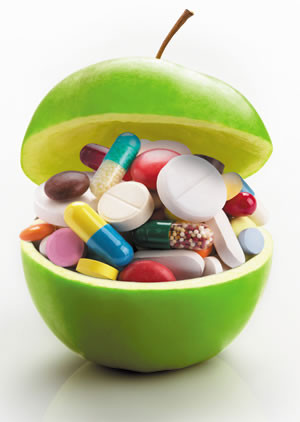
Counting steps is good — is combining steps and heart rate better?

Appendix pain: Could it be appendicitis?

Can saw palmetto treat an enlarged prostate?

How does Ozempic work? Understanding GLP-1s for diabetes, weight loss, and beyond

Zinc: What it does for the body, and the best food sources

Respiratory health harms often follow flooding: Taking these steps can help

Tips to leverage neuroplasticity to maintain cognitive fitness as you age

Can white noise really help you sleep better?

Celiac disease: Exploring four myths

What is prostatitis and how is it treated?
Heart Health Archive
Articles
Grain of the month: Barley
You may be familiar with the claims featured on packages of old-fashioned oatmeal, which note that "As part of a heart-healthy diet, the soluble fiber in oatmeal can help reduce cholesterol." Guess what? Back in 2008, the FDA also approved the equivalent health claim for barley products.
In fact, barley contains about three times as much fiber per serving as oats. Barley is particularly rich in a type of soluble fiber known as beta glucan, which is recognized for its cholesterol-lowering abilities. Barley is also a good or excellent source of several vitamins and minerals.
Lifestyle changes are important for managing atrial fibrillation
Many lifestyle factors can influence the development of atrial fibrillation, and doctors now better understand the importance of these factors in treating afib. Those who are at risk of developing afib can take action to improve their health, and in some cases they may be able to reduce their symptoms.
Pain relief that's safe for your heart
Some common painkillers may boost the odds of a heart problem. Use them wisely to lessen your risk.
In 2004, the drug maker Merck pulled rofecoxib (Vioxx) off the market, following revelations that the popular prescription painkiller increased the risk of heart attacks and strokes. That action triggered a closer look at drugs in the same class, known as nonsteroidal anti-inflammatory drugs (NSAIDs). These drugs, which are widely used to ease pain, quell inflammation, and cool fevers, include over-the-counter drugs such as aspirin, ibuprofen (Advil, Motrin), naproxen (Aleve, Naprosyn) and the prescription drug celecoxib (Celebrex).
Dietary supplements: Sorting out the science
Image: Nomadsoul1/Getty Images |
A few supplements show limited, possible benefits for people with heart disease. But some popular ones don't—and others may be dangerous.
Depression and heart disease: A two-way street
Watch for the warning signs of depression, which is often missed in people with heart disease.
Image: gpointstudio/Thinkstock
All people have days when they feel sad, gloomy, or down in the dumps. But if those feelings last for weeks and you gradually stop feeling hopeful or happy about anything in your life, you may have depression. Like heart disease, depression is common, so it's not unusual to have both conditions together. In fact, depression is about twice as likely to occur in people with heart disease compared with the general population. And people with depression face a heightened risk of heart disease.
"It's really important for people to be aware of this link and to get treatment for depression, because it can be very debilitating," says Dr. Christopher Celano, a psychiatrist at the Cardiac Psychiatry Research Program at Harvard-affiliated Massachusetts General Hospital.
Avoiding atrial fibrillation
How maintaining a healthy weight and other lifestyle habits can help prevent this common heart rhythm disorder.
During a bout of atrial fibrillation, your heart may beat so rapidly, it may feel as though it's going to explode out of your chest. Commonly known as afib, this heart rhythm problem can leave you breathless and lightheaded—or cause no symptoms at all. About 9% of people ages 65 and older have afib, which raises the risk of stroke and other heart-related problems. But there are ways to lower your odds of developing afib—or to reduce its impact if you already have the condition.
Lessen your load
By far, the most important step you can take is to attain and stay at a healthy weight. "We have good evidence from multiple studies showing that people who are overweight have a higher risk of afib than people who are at a healthy weight," says Harvard professor of medicine Dr. Christine Albert, former director of the Center for Arrhythmia Prevention at Brigham and Women's Hospital. And the more you weigh, the higher your risk: people who are overweight have a 20% to 25% higher risk, whereas those who are obese (a body mass index, or BMI, of 30 or higher) have a 60% higher risk.
When heart attacks go unrecognized
A high pain tolerance may account for some "silent" heart attacks. But failing to recognize atypical symptoms is a more likely explanation.
Image: © digitalskillet/Getty Images
Nearly half of people who have a heart attack don't realize it at the time. These so-called silent heart attacks are only diagnosed after the event, when a recording of the heart's electrical activity (an electrocardiogram, or ECG) or another test reveals evidence of damage to the heart.
What's behind this surprising phenomenon? One explanation may be a higher-than-average tolerance for pain, as a recent study suggests (see "Does a high pain tolerance mask heart attack symptoms?"). Other people mistake their symptoms as indigestion or muscle pain. Still others may feel pain, but in parts of their upper body other than the center of the chest.
Ask the doctor: How to slow a racing heart
Q. After several episodes where my heart suddenly started racing, I was diagnosed with supraventricular tachycardia. My doctor said I could try gagging or coughing to help slow down my heart when these episodes occur. Why would those things help?
A. Supraventricular tachycardia (SVT) is caused by an electric problem in the area above the heart's lower chambers, or ventricles. This uncommon disorder can cause the heart to beat more than twice as fast as normal—even up to 300 times a minute. It is more common in younger people than in older folks.
What's that chest pain?
Sometimes it's hard to tell the difference between a heart attack, heartburn, and lung problems.
Image: © PeopleImages/Getty Images
Many kinds of health problems can cause chest discomfort, with symptoms so intense that you rush to the hospital. "I see older adults with chest pain or something related to it every time I work in the emergency department," says Dr. Kei Ouchi, an emergency medicine physician at Harvard-affiliated Brigham and Women's Hospital.
The big fear
You may worry that chest pain is due to a heart attack, which occurs when blood flow to the heart is blocked, typically by a blood clot and narrowed arteries. Classic symptoms include pressure or squeezing in the chest, lightheadedness, and pain in the shoulder, arm, neck, jaw, or back.

Counting steps is good — is combining steps and heart rate better?

Appendix pain: Could it be appendicitis?

Can saw palmetto treat an enlarged prostate?

How does Ozempic work? Understanding GLP-1s for diabetes, weight loss, and beyond

Zinc: What it does for the body, and the best food sources

Respiratory health harms often follow flooding: Taking these steps can help

Tips to leverage neuroplasticity to maintain cognitive fitness as you age

Can white noise really help you sleep better?

Celiac disease: Exploring four myths

What is prostatitis and how is it treated?
Free Healthbeat Signup
Get the latest in health news delivered to your inbox!
Sign Up










